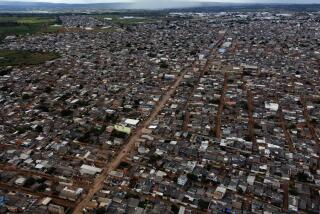Mozambican City, Home to Squatters, Fights to Live
- Share via
BEIRA, Mozambique — Potholes the size of bathtubs pit the streets. Plumbing and electricity fade from reality to memory. Thousands of squatters live in the once-elegant Grand Hotel.
The smell of too many people in too little space drifts on a lazy Indian Ocean breeze over a city built for 60,000 people that has become a home of sorts to 400,000, most of them squatters.
At the Grand Hotel, everything burnable was pillaged from the casino long ago, for cooking and warmth. Vast chandeliers, of no use as fuel, still hang in the ballroom and lobby, shrouded in dust.
Beira has fallen victim to one of Africa’s longest and deadliest conflicts, which has killed an estimated 600,000 people and displaced 1 million, many of whom have fled to refugee camps in neighboring countries.
First, the nation was convulsed by 10 years of fighting between the colonial armies of Portugal and neighboring Zimbabwe, then white-ruled Rhodesia, against Marxist guerrillas of the Frelimo movement.
Frelimo led the country to independence in 1975 and, two years later, the brutal Renamo rebel movement began a guerrilla war that still continues.
In Beira, “people are scratching to survive,” said Chris Notley, a British-born aid worker.
In the first years of black rule, Marxist governments nationalized key enterprises and private property throughout this southeast African nation.
At least 120,000 Portuguese settlers fled the northern provinces. They burned farms, homes and vehicles, sabotaged factories and plugged toilets and drains with concrete.
The government has begun opening to the West, and some signs of revival can be seen in Beira.
Foreign businesses are negotiating with provincial authorities take over businesses, buildings and land in and around the city.
Electricians are trying to untangle the city’s neglected wiring. The unused golf course, mown for the first time in 14 years when Pope John Paul II visited Beira in 1988, now is groomed more often.
Aid workers expect recovery to be slow. One reason, they say, is a crushing bureaucracy inherited from Portuguese colonialists and administrators supplied by East Germany after independence.
“Mozambicans learned about bureaucracy from Portugal, the most backward country in Europe,” said Erik Greby, a Danish aid executive involved in rehabilitating the harbor.
More to Read
Sign up for Essential California
The most important California stories and recommendations in your inbox every morning.
You may occasionally receive promotional content from the Los Angeles Times.













